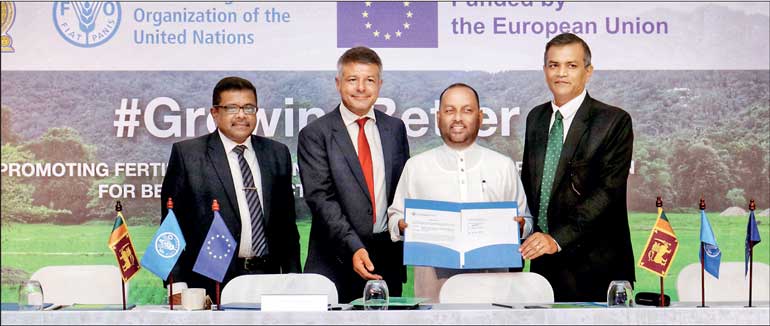Tuesday Feb 24, 2026
Tuesday Feb 24, 2026
Wednesday, 8 February 2023 00:25 - - {{hitsCtrl.values.hits}}

From left: Ministry of Agriculture Secretary Gunadasa Samarasinghe, European Union Ambassador to Sri Lanka and the Maldives Denis Chaibi, Minister of Agriculture Mahinda Amaraweera, and FAO Representative for Sri Lanka and the Maldives Vimlendra Sharan at the signing of the official project document
The European Union (EU) has allocated 4 million Euro (approximately Rs. 1.5 billion) in grants for fertilisers, seeds, and training to the most vulnerable farmers, as a response to the agriculture and food security crisis in Sri Lanka.
These funds will be implemented by the Food and Agriculture Organization (FAO) in Sri Lanka. The action has been officially launched yesterday in Colombo.
The recent economic crisis severely impacted all farmers in the country, especially smallholder farmers cultivating lands of up to 0.5 ha. These farmers have suffered immensely due to a major crop failure over the previous two harvesting seasons due to a lack of fertilisers and other inputs. This has led to reduced income and impacted their ability to provide for their essential needs, including food.
European Union Ambassador Denis Chaibi said: “I am very pleased to announce this new action today. We teamed up with FAO to help bring Sri Lankan agriculture back on track to prevent food shortages and to increase farmers’ incomes. Together we will provide highly essential inputs such as fertilisers and seeds. We will also train farmers and extension officers on how to shift to less resource intensive paddy cultivation practices. I hope this new support will contribute towards an organised transition to a more sustainable, resilient, and productive agriculture sector in Sri Lanka.”
FAO Representative in Sri Lanka Vimlendra Sharan said: “We are appreciative of this generous assistance from the European Union, which will not only provide essential inputs to boost production but also reduce the agriculture sector’s reliance on chemical fertiliser by increasing the efficiency of the fertiliser used while increasing yield.”
“As FAO we will work closely with the Ministry of Agriculture and Ministry of Irrigation to ensure the success of this project which will make a strong case for adopting sustainable practice across the country.”
The project will support 41,000 smallholder farmers cultivating land holdings of up to 0.5 Ha in the districts of Polonnaruwa, Badulla, Ampara, and Hambantota. They will each receive a 50 kg bag of urea for the 2023 Yala cropping season. In addition to that, targeted capacity building will be provided to those farmers as well as extension workers on how to use fertiliser efficiently, reduce actual needs for chemical fertiliser, enhance the use of organic fertiliser and improve long-term soil fertility. To strengthen the seed paddy production system in Sri Lanka to meet current demand, the project will also support farmers to grow quality paddy seeds and strengthen government-owned farms in growing and processing certified paddy seeds.